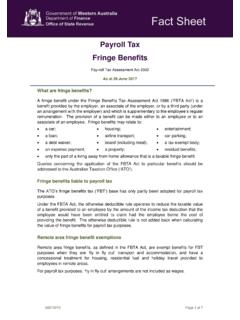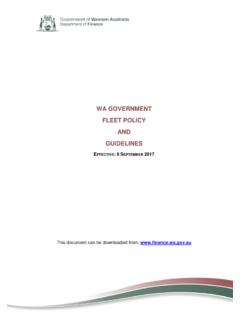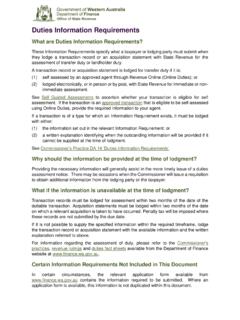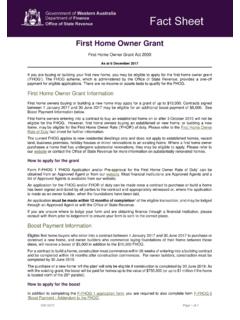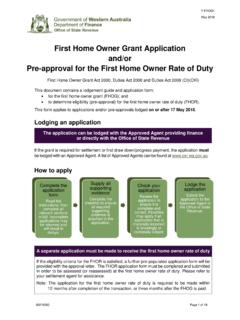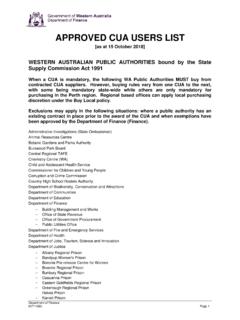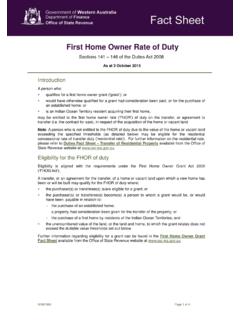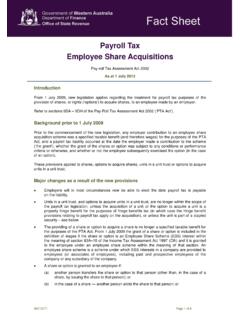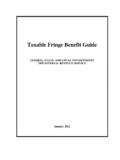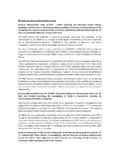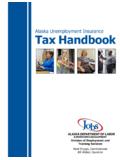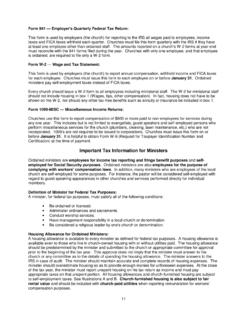Transcription of Payroll Tax Wages Definition
1 00403542 Page 1 of 6 Payroll Tax Wages Definition Pay-roll Tax Assessment Act 2002 As at 25 May 2018 The Payroll Tax Employer Guide should be read in conjunction with this fact sheet. Taxable Payments Wages are defined in Part 2 of Division 2A of the Pay-roll Tax Assessment Act 2002 ( PTA Act ) as including the types of payments identified below. Salaries and Wages The gross salary or wage of an employee is liable to Payroll tax. This includes entitlements and deductions made to or in relation to an employee, such as income tax, hospital benefit fund contributions, union fees, superannuation, holiday pay and termination payments such as accrued leave entitlements or deferred Wages .
2 Payments can be paid or payable, in cash or in kind, at piece rates or otherwise and be either to or in relation to an employee. These payments are also liable if paid or payable to the employee by someone acting on behalf of the employer. Commissions, bonuses and allowances Commissions, bonuses and allowances paid or payable to or in relation to employees, whether in cash or in kind, are liable to Payroll tax. These payments are also liable if paid or payable by someone acting on behalf of the employer. Exemptions are provided for reasonable motor vehicle and accommodation allowances.
3 For more detailed information, please refer to Revenue Ruling PTA 005 Exempt Allowances - Motor Vehicle and Accommodation . Director s remuneration Remuneration paid or payable to a director, whether as a working director or not, is liable to Payroll tax. 00403542 Wages Definition Fact Sheet Page 2 of 6 Superannuation contributions Employer contributions to an employee s superannuation fund are liable to Payroll tax. For a detailed explanation of the Payroll tax liability of contributions to an employee's superannuation fund, please see the Superannuation fact sheet.
4 Contracting arrangements Payments made to certain workers (often called contractors or subcontractors) will be taken to be Wages liable to Payroll tax if they are engaged under a contract of service (that is, they have a common law relationship of employer/employee). If the worker is an individual who is essentially only providing the labour (and in the case of a tradesperson, the tools of trade) and is being paid an hourly or piecemeal rate, it will generally be considered they are engaged under a contract of service, even if the payment for the work performed is being made to the worker s company, partnership or family trust.
5 The engaging party is deemed to be the employer and is liable to Payroll tax on those Wages . For more information please see Revenue Ruling PT 6 Guidelines on Subcontracting Arrangements - Employment Agents . A determination can be made on submission of form FPRT6 Questionnaire: Contractor Payments . Employment agents Payments made by a person (often an employment agent) directly or indirectly to another person who was engaged to perform services for a client of the first person (the employment agent) are Wages for the purposes of Payroll tax.
6 The employment agent is deemed to be the employer and is liable to Payroll tax on the payments made. For more information please see Revenue Ruling PT 6 Guidelines on Subcontracting Arrangements - Employment Agents and Revenue Ruling PT 7 Employment Agency Arrangements Chain of On-hire . Fringe benefits Fringe benefits, as defined and valued for the purposes of the Fringe Benefits Tax Assessment Act 1986 (Cth) ( FBTA Act ), are generally liable to Payroll tax. For a detailed explanation of the Payroll tax liability of fringe benefits, please refer to the Fringe Benefits fact sheet.
7 Salary sacrifice A salary sacrifice arrangement refers to an arrangement between an employer and the employee whereby the employee agrees to forego part of their future salary or wage in return for some other form of non-cash benefits of equivalent cost to the employer. The non-cash benefits provided may include pre-tax superannuation contributions, the 00403542 Wages Definition Fact Sheet Page 3 of 6 provision of a motor vehicle, a laptop or similar portable computer, car parking fees, payment of school fees or the payment of membership fees and subscriptions.
8 Under an effective1 salary sacrifice arrangement: the employee pays income tax on the reduced salary or wage; salary sacrificed (pre-tax) superannuation contributions are classified as employer contributions (not employee contributions); and the employer may be liable to pay fringe benefits tax on the fringe benefits provided. With regard to Payroll tax, under an effective salary sacrifice arrangement: the reduced salary or wage on which the employee pays income tax is treated as taxable Wages ; the pre-tax superannuation contribution classified as the employer contribution is taxable; and the taxable value of a benefit under the FBTA Act is grossed-up by the Type 2 factor as shown on the FBT return.
9 If the benefit provided to the employee is exempt from fringe benefits tax, Payroll tax is payable only on the reduced salary on which the employee pays income tax, not the amount sacrificed for that benefit. Some employees agree to make regular donations to charitable organisations of their choice under a 'Workplace Giving' program. This arrangement is not considered a salary sacrifice arrangement. The following examples outline the Payroll tax treatment of various salary sacrifice arrangements: An employee with a current salary of $70,000 per year negotiates with their employer for the provision of a car under a salary sacrifice arrangement.
10 As a result, their salary will be reduced to $58,000 per year. The taxable value grossed-up by the Type 2 factor of the car for fringe benefits tax purposes is $6,350. Payroll tax will be payable on the $58,000 salary and the FBT taxable value of $6,350. An employee's current salary is $65,000 per year. The employee negotiates with the employer for the purchase of a laptop computer under a salary sacrifice arrangement, reducing their salary to $62,000. As the laptop is exempt from FBT, Payroll tax is payable on the $62,000 salary.
